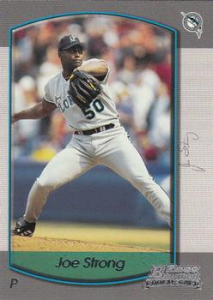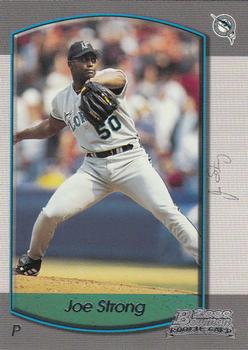June 24, 2000: 37-year-old rookie Joe Strong records first major-league win
 When the Florida Marlins and Chicago Cubs met for the second game of a late June three-game series, both teams were far off the pace in their respective divisions. Each had come into the season projected to finish fifth, the Marlins in the five-team NL East, the Cubs in the six-team NL Central. Approaching the halfway mark, the projections weren’t far off. The Marlins, led by skipper John Boles, were still suffering a kind of hangover from a 1997-1998 fire sale that saw much of the core of their 1997 World Series championship team traded off, including former All-Stars Moises Alou, Jeff Conine, Bobby Bonilla, and Gary Sheffield. As play commenced on June 24, they were in fourth place, 9½ games behind first-place Atlanta.
When the Florida Marlins and Chicago Cubs met for the second game of a late June three-game series, both teams were far off the pace in their respective divisions. Each had come into the season projected to finish fifth, the Marlins in the five-team NL East, the Cubs in the six-team NL Central. Approaching the halfway mark, the projections weren’t far off. The Marlins, led by skipper John Boles, were still suffering a kind of hangover from a 1997-1998 fire sale that saw much of the core of their 1997 World Series championship team traded off, including former All-Stars Moises Alou, Jeff Conine, Bobby Bonilla, and Gary Sheffield. As play commenced on June 24, they were in fourth place, 9½ games behind first-place Atlanta.
As for the Cubs, who were also in fourth (12 games back), the team was beset with some internal drama centered on slugger Sammy Sosa, who was embroiled in a disagreement with manager Don Baylor, then in his first season with the team. Baylor and Sosa had been at odds from the first day Baylor took the job, in November 1999, when he suggested that Sosa (the 1998 NL MVP) needed to become a more complete player if the Cubs were to compete.1 Sosa took exception to Baylor’s remarks, and the conflict escalated to the point that as the Cubs arrived in Miami for the series, the team reportedly was on the brink of completing a trade with the New York Yankees that would send him and pitcher Ismael Valdéz to New York in exchange for seven players.2
Sosa had also found himself under scrutiny for accusations that personnel associated with a charity that bore his name had misappropriated funds, including spending $30,000 on a car for his brother; the day he arrived in Miami, however, he announced that the foundation had resolved the issues, in part by his writing a check to cover roughly $126,000 in disputed expenditures.3
Despite Sosa’s troubles, he was still a marquee name. Earlier on game day, he’d been celebrated in festivities in Miami’s Little Havana section, where Mayor Joe Carollo declared the day “Sammy Sosa Day,” and Sosa received a star on the Calle Ocho “Walk of Fame,” which honors Hispanic stars.4 In good part because of Sosa’s presence, the sellout game that night drew 35,140 to “floppy hat day”—the largest home crowd that season to date, boosted by 8,550 walk-up ticket sales, then the second most in team history.5
As starting pitchers, Baylor sent 11-year veteran righty Kevin Tapani to the mound, while Boles countered with 30-year-old rookie Chuck Smith, a right-hander the Marlins had acquired from Texas in a June 9 three-way deal that also involved the Cubs. Tapani, 4-7 with a 5.07 ERA, represented a last-minute switch, as Valdez had been scheduled, but Baylor had to scratch him because of a nagging blister on his pitching hand.6 Smith, who’d made his major-league debut on June 13, was 0-1 with a 1.98 ERA in 13⅔ innings. His sole loss had been a heartbreaker, as he’d given up only two runs on four hits and a walk in 7⅔ innings while striking out 11 in his most recent start, against Milwaukee.
Besides Tapani, Baylor also made two other adjustments, sitting two slumping players—third baseman Willie Greene (.175 to that point for June) and outfielder Henry Rodríguez (.188 to that point for June). In their place, he inserted infielder José Nieves and outfielder Brant Brown. The Cubs had picked up Brown as part of the same three-team deal that brought Smith to the Marlins.
For seven innings, Baylor’s moves seemed to pay off.
The teams traded zeros in the first and second, but in the top of the third, Nieves led off for the Cubs with a triple to center—the first of three extra-base hits he’d have in the game. He scored on a one-out single by Eric Young Sr. The score remained 1-0 until the bottom of the fifth, when Preston Wilson, leading off, tied it with his 15th homer of the season. The Cubs broke the tie in the seventh. Again, Nieves was key, as he led off with a double, moved to third on Tapani’s sacrifice, then scored on another single by Young. Ricky Gutierrez’s single moved Young to third, and he came in on a sacrifice fly by Sosa. The Marlins made the score 3-2 when Derrek Lee hit his 13th home run of the season, his first of the season at Pro Player Stadium—in fact, his first homer in Miami since August 5, 1998, a span of 248 at-bats in his home ballpark.7
It was then that the two skippers began pulling strings. First, Boles sent in southpaw Vic Darensbourg to relieve Smith, but he gave up a leadoff single to Damon Buford. Baylor had switch-hitter Gary Matthews Jr. bat for the left-handed-swinging Brown and Matthews singled, Buford moving to second. Darensbourg managed two outs—one when Buford was caught trying to steal third, and the second when Jeff Reed struck out swinging.
With the right-handed-batting Nieves due up, Boles brought on 37-year-old rookie right-hander Joe Strong. A veteran of 17 seasons of minor-league and international ball, Strong had arrived in the major leagues with much fanfare in May because of his age and determination. Reportedly, three years before he’d kept his arm in shape by throwing in the Sears warehouse where he was working while trying to find a team to latch onto.8 Strong was the oldest player to make his debut in 40 years, since 41-year-old Diomedes Olivo for Pittsburgh in 1960.
As he came on to pitch, Strong was 0-1 with a 5.51 ERA in 13 appearances, covering 16⅓ innings. On his second pitch, he gave up a run-scoring double (Nieves’ third hit of the day), and then ended the inning by inducing Glenallen Hill, pinch-hitting for Tapani, to ground to third.
To start the bottom of the eighth, Baylor brought in pitcher Tim Worrell, who gave up a double to Dave Berg, sandwiched between two groundouts. Then, with lefty Mark Kotsay due up, Baylor summoned southpaw Félix Heredia, who failed to retire either of the batters he faced, giving up an RBI single to Kotsay and walking Cliff Floyd.
Baylor sent in Rick Aguilera in relief to face Wilson, and the wheels came off for the Cubs. On a 2-and-0 pitch, Wilson slammed a three-run home run to deep right field. The crowd erupted: “Teal streamers fell from the upper deck and more than 35,000 were on their feet. … Suddenly, Pro Player Stadium—the doormat piece of football landscape where the Marlins had been dead and buried for more than two years—was alive, rocking with the loudest roar anyone has heard since Edgar Rentería’s [walk-off] single lifted this franchise to the World Series title.”9
Lee, batting next, made the score 7-4 when he hit his second homer of the day on Aguilera’s first pitch to him. That closed out the scoring: after a walk to Kevin Millar, batting for Strong, Aguilera ended the inning on an Álex González pop to third.
Boles brought on closer Antonio Alfonseca to pitch the ninth, and he set down the Cubs in order, to record his 22nd save, on his way to a league-leading 45 for the season. The win went to Strong, his first, and, as it turned out, only victory in the major leagues. Heredia took the loss, making his record 3-2.
Boles saw the comeback win as the start of a turnaround for the Marlins: “Honest to goodness, I really see this is a resurrection for this club,” he said. “I think that it’s time that we were forgiven. It’s time to move forward. It’s time to stop talking about the dismantling and these young kids and these no-names and the ballpark and the weather. It’s time to get South Florida juiced up about major league baseball here. This game does it, in my opinion.”10
As it turned out, the Marlins did not catch fire after the game. Although they won the next day in dramatic fashion—a walk-off, 8-7 victory on Floyd’s solo home run—they played sub-.500 ball the rest of the way, although they managed to squeeze into third place. The Cubs finished last in the Central Division, tied with Philadelphia for the worst record in the major leagues, 65-97.
Also, as it turned out, Sosa ended up going nowhere—at least that year. On June 29 the Yankees pulled the plug on a deal for him, choosing instead to trade for David Justice, whom they got from Cleveland, for three players. Sosa hit a league-leading 50 home runs in 2000.
Strong finished the year with 18 appearances and a 1-1 record with a 7.32 ERA.
Acknowledgments
This article was fact-checked by Bruce Slutsky and copy-edited by Len Levin.
Photo credit: Trading Card DB.
Sources
In addition to the sources cited in the Notes, the author consulted Baseball-Reference.com, Retrosheet.org, and Stathead.com.
https://www.baseball-reference.com/boxes/FLO/FLO200006240.shtml
https://www.retrosheet.org/boxesetc/2000/B06240FLO2000.htm
Notes
1 Paul Sullivan, “Baylor Brings Aggressive Approach to Cubs,” Chicago Tribune, November 2, 1999: 45.
2 Teddy Greenstein, “Sosa Takes Circus with Him to Miami,” Chicago Tribune, June 24, 2000: 51.
3 Teddy Greenstein, “Just Another Day in Busy Life of Sosa,” Chicago Tribune, June 25, 2000: 27.
4 Greenstein, “Just Another Day in Busy Life of Sosa.”
5 Cesar Brioso, “Marlins’ Comeback Win a Blast for Big, Boisterous Crowd,” South Florida Sun Sentinel (Fort Lauderdale), June 25, 2000: 41.
6 Teddy Greenstein, “Sosa: It’s Not About the Money,” Chicago Tribune, June 25, 2000: 34.
7 Brioso.
8 David O’Brien, “Strong’s Odyssey: Sears to Unicorns,” South Florida Sun Sentinel, May 12, 2000: 28.
9 Mike Phillips, “A Night of Wilson, Lee—and 35,000,” Miami Herald, June 25, 2000: C-1.
10 Brioso.
Additional Stats
Florida Marlins 7
Chicago Cubs 4
Pro Player Stadium
Miami, FL
Box Score + PBP:
Corrections? Additions?
If you can help us improve this game story, contact us.


